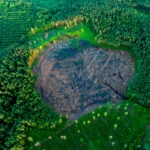The benefits of using natural capital to measure social welfare
The natural world possesses deep value that economic systems have been shunning for centuries. However, understanding and harnessing this natural capital is key to finding solutions to climate change. New Zealand is a prime example of how countries can integrate this concept within their business community and public institutions. In BBVA’s monographic study titled ‘Natural capital, curbing climate change’, you can learn more about the benefits and rewards of using natural capital as a means of improving social well-being.

In recent years, New Zealand has been leading the way when it comes to integrating the concept of natural capital into its decision-making. There, this concept is part of a broader set of indicators used to measure the level of well-being within New Zealand society and gauge its sustainability in the short, medium and long run.
This is just one way of making natural capital part of the national accounting system. The aim here is to move towards indicators of wealth and development no longer predicated on GDP. The new system does a much better job at factoring in the wealth of the natural environment, thus helping to steer a path out of the climate and environmental challenges we have witnessed in recent decades. However, the scope of this concept should not be restricted to national accounts. Notably, it can also be applied to companies (as indeed is happening now).
“Accounting for and unlocking the value of natural capital offers businesses valuable information on what kind of ecosystems they are impacting with their activities, whether or not they are vulnerable, what state they are in, and what offsetting and mitigation measures they can put in place in a bid to neutralize the impact,” explains Sandra Magro, doctor in Ecology and Ecosystem Restoration and founding partner of the company Creando Redes, which strives to unlock the true value of natural capital.
For countries and institutions alike, understanding the economic value of natural capital showcases the positive effect that the environment can have on quality of life and economic prosperity. Ultimately, this allows for smarter decisions that include environmental considerations and ensure its sustainability in the long run. According to Conservation International, valuing natural capital allows governments to be accountable to nature, given its relationship with the economy and development.

Benefits of using natural capital as a business tool
For the private sector and businesses, as pointed out by the European Business and Biodiversity Campaign, accounting for natural capital provides clear advantages, notably:
- Identifying critical points along the supply chain allowing users to include natural capital in their decision-making.
- Identificación de puntos críticos en la cadena de suministro and in risk management, thus avoiding possible business interruptions due to environmental damage or scarcity of resources.
- Enhanced reputation in the eyes of society and consumers through real actions that genuinely improve the relationship between business and nature.
- Helps to quantify the real value delivered to society.
For all these reasons, the natural capital approach has emerged as a powerful tool for the public and private sectors alike. This new method not only provides clear metrics for decision-making, but also opens the door to further progress in numerous business realms. In a nutshell, the new system heralds a significant improvement in social welfare and is a major step forward toward a more sustainable future for all.